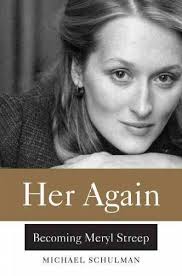Merrily she rolls along

Every American loves their national treasure, Meryl Streep, except Donald Trump. He regards her as ‘one of the most over-rated actresses in Hollywood’. And judging by his snide undertone, Michael Schulman, who penned this unauthorised biography, is not that keen.
On the surface everything in the garden is rosy. Writing in a rather breathless, women’s magazine style, Schulman details Streep’s conventional upbringing in Bernardsville, New Jersey.
Using as archival material the 1967 Bernadian yearbook, Schulman paints a picture of a young woman whose first acting role was to put herself ‘where the boys are’. He suggests that girls universally disliked Streep because they could see through her disingenuous persona: sweet and girlish, passive and tongue-tied, in order to snare beaux. But this behaviour was normal for the period. Red-hot poker type girls were required to disguise themselves as shade-loving violets.

Among eighty or so interviewees Schulman foregrounds Mike Booth, a childhood sweetheart, who ‘let her go’ before joining up and serving as a medic in Vietnam. Schulman centres Booth as ‘a major character’ in Becoming Meryl Streep. But he’s not really. He was her first boyfriend and they kept in touch for a while. But he was not an influence in her life as she progresses towards success and recognition as an actor.
It’s almost as if Schulman is licking his lips as he imagines his very own, well-researched, script for a film about Streep’s early life. Maybe he’s written the acceptance speech for his Best Original Screenplay award?
It’s easy to visualise an early moment, one imagined rather than documented by Schulman, when Streep rips out her tooth braces and crushes her spectacles. In this Schulman-scripted film, later shots would show Streep resculpting herself on ‘an apple a day’ until the occasion in 1975, at the graduation of the Yale Drama School, when the slender, white-clad woman ‘stood out like a blaze of light’. Think of the overhead shot. Every other graduate wore black and, apparently all the other women went, ‘Bitch, why didn’t I think of that?’

In my imagination Schulman’s blockbuster film, has Streep’s scenes of ivy league campus life, interwoven with frantic iterations of Booth. Nestling within the breast pocket of his scrubs would be letters from Streep, placed close to his heart. He is seen darting from injured GIs to Vietnamese children with napalm burns. What a movie Schulman could write! Move over The Deer Hunter.
What is more difficult to foresee is Streep giving permission for this ‘film’ to be written, since her spokesman states ‘Ms Streep has no comment. She made no contribution to this book nor has she read it’. Herein lies the problem.
It is likely that Streep is not overly concerned with this ‘chick-lit’ account of her teenage years. What may well have displeased her is a later section dealing with Dustin Hoffman and Kramer vs Kramer. The chapter, ‘Joanna’, was separately published in Vanity Fair. On its website, philly.com, the Philadelphia Inquirer suggests the excerpt ‘justifies buying the book, but Schulman’s tone is so annoying’ that it would be better just to read the April edition of Vanity Fair. You could just look at the magazine’s website, March 29th 2016.
Schulman interviewed the producer of Kramer vs Kramer, Richard Fischoff, who purportedly said that Method-actor, Hoffman, had slapped Streep. ‘He was goading her and provoking her, using stuff that he knew about her personal life and about John to get the response that he thought she should be giving in her performance.’
The film, made in 1978, followed on, fairly closely, from the death of John Cazale (Fredo in The Godfather), Streep’s lover and co-star on The Deer Hunter. Streep had been at his bedside, on March 12th of that year, when Cazale died, aged 42, of cancer. Schulman suggests that it might have been the ‘still-fresh pain’ which gave Streep the vulnerability needed to play the part of the mother who deserts her child, twice, in Kramer vs Kramer.

It would seem that neither Hoffman nor Schulman realise that Streep is an actor. Her job involves playing characters. She does not need to lose a lover to play vulnerable.
Meryl Streep won her first Oscar for Best Supporting Actress in Kramer vs Kramer. Schulman opens his biography with an account of Streep’s most recent Best Actress win for The Iron Lady in 2012. It is in that acceptance speech that Streep utters the words, which give the book its title, ‘Her again’. She knows that she has been around the Academy Awards for some time, frequently nominated, and winning, so far, three times. In a typically self-mocking manner Streep acknowledges that she is always turning up at awards ceremonies. She can understand if people are fed with her.
In the acknowledgments Schulman thanks Streep ‘for not throwing up any significant roadblocks’. Had she co-operated with his book it would have been better. His bitterness is palpable. Her greatness and dignity is obvious in the way that she distances herself from the book.
Works cited
Benton, Robert, Stanley R. Jaffe, Dustin Hoffman, Meryl Streep, Jane Alexander, Justin Henry, Nestor Almendros, Gerald B. Greenberg, and Avery Corman. Kramer Vs. Kramer. 2001.
Schulman, Michael. Her Again: Becoming Meryl Streep. Faber& Faber. 2017.
An earlier version of this review was first published on p37 of the Irish Examiner Weekend section on 18th March 2017.